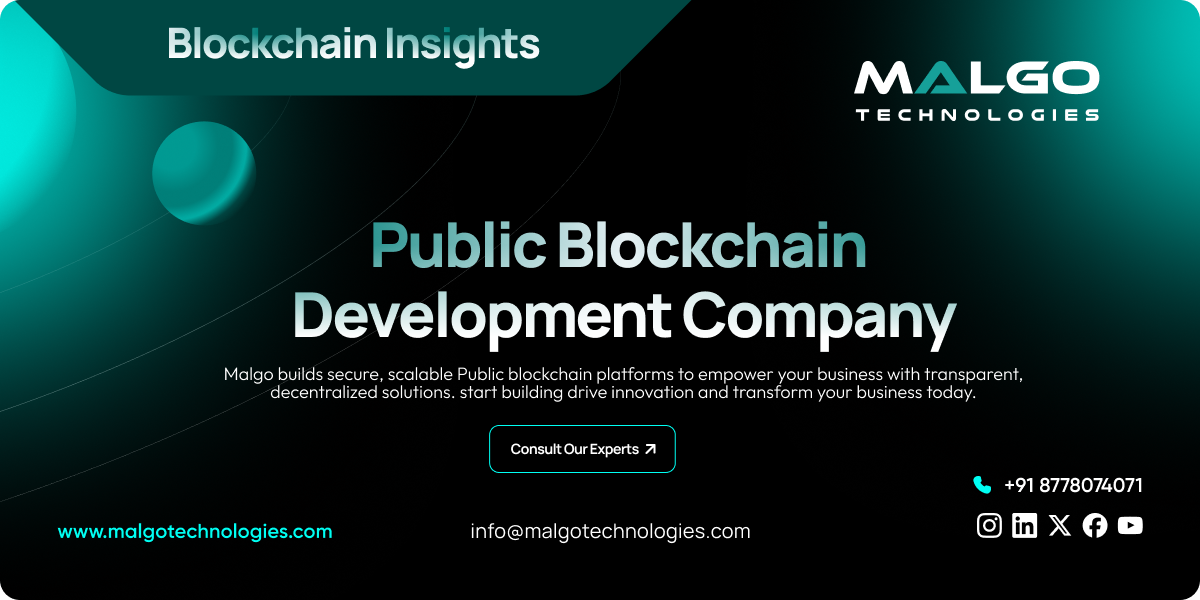Introduction
A public blockchain development company specializes in creating decentralized networks where anyone can join, verify transactions, and participate without needing permission. Public blockchains operate openly and transparently, allowing individuals and organizations worldwide to build applications that are secure, tamper-resistant, and trustless. These companies help bring ideas to life by building systems that run on widely used blockchains like Ethereum, Solana, or Polygon, enabling projects that range from financial platforms to digital art marketplaces.
What is a Public Blockchain?
A public blockchain is a distributed ledger technology that operates without a central authority. Anyone with internet access can join the network, validate transactions, and maintain a copy of the ledger. Blockchain development plays a key role as transactions on these blockchains are recorded publicly and cannot be altered once confirmed, ensuring transparency and trust. Popular examples include Bitcoin and Ethereum, which allow developers to build applications that rely on open, decentralized infrastructures.
Why Organizations Build on Public Blockchains?
Organizations choose public blockchains because they offer global accessibility, censorship resistance, and enhanced security. Since these blockchains are permissionless, they allow applications to reach a broad audience without gatekeepers. They also provide a trustworthy environment where transactions are verifiable by anyone, reducing the need for intermediaries. This openness helps businesses innovate in areas like finance, supply chain, gaming, and governance.
Core Public Blockchain Development Services
Public Blockchain-Based Application Development
Public blockchain development companies build permissionless systems that connect users worldwide. They support major chains such as Ethereum, Solana, and Polygon, enabling applications to tap into vast user bases and robust ecosystems. These applications can range from decentralized finance (DeFi) tools to NFT platforms, offering users seamless access without centralized restrictions.
Smart Contract Development
Developers create smart contracts using languages like Solidity, Vyper, and Rust to automate agreements and processes on blockchains. These self-executing contracts handle everything from decentralized finance operations to NFT minting and DAO governance. Their code runs exactly as programmed, eliminating the need for middlemen and reducing risks of manipulation.
Decentralized Application (DApp) Development
DApps offer users direct interaction with blockchain networks through user-friendly interfaces. Companies provide full-stack Web3 integration, including support for popular wallets such as MetaMask and Phantom, allowing users to manage assets and sign transactions securely. This service bridges the gap between complex blockchain operations and everyday users.
Token Creation and Customization
Token development includes creating standards like ERC-20, BEP-20, SPL, and ERC-721, which represent various digital assets from cryptocurrencies to unique collectibles. Custom tokens can be designed for purposes such as minting, staking, or providing utility within ecosystems. This helps projects create economies that incentivize user participation.
NFT Marketplace Engineering
Building NFT marketplaces involves incorporating features like royalties, auctions, and metadata storage to manage digital art and collectibles. Integration with decentralized storage solutions like IPFS or Filecoin ensures that assets remain accessible and secure over time. These platforms empower creators and buyers through transparent ownership and transaction records.
DeFi Platform Development
DeFi development covers lending protocols, yield farming, liquidity pools, and custom decentralized exchanges (DEX). These platforms enable users to borrow, lend, trade, and earn returns on their digital assets without relying on traditional banks or brokers. Public blockchain development companies ensure these systems operate reliably and securely.
DAO Framework Development
Decentralized autonomous organizations (DAOs) allow token holders to vote on decisions and proposals, providing open governance. Development services include building token-based voting systems, treasury management, and proposal submission tools. DAOs enable communities to control their projects democratically.
Blockchain Wallet Development
Wallets are essential for managing blockchain assets. Development focuses on multi-chain support for hot and cold wallets, along with secure options like seed phrases and biometric authentication. This ensures users can safely store and transfer digital assets across different blockchains.
Cross-Chain and Interoperability Solutions
Bridges and messaging layers such as Cosmos IBC and LayerZero help different blockchains communicate, enabling asset transfers and data sharing. This interoperability reduces isolation between networks and expands the possibilities for decentralized applications.
Blockchain Node and API Infrastructure
Reliable node hosting, indexers, and monitoring dashboards form the backbone of blockchain applications. These services allow projects to access blockchain data efficiently and maintain network performance, ensuring smooth user experiences and fast transaction processing.
Key Components of Public Blockchain Applications
Decentralization
Public blockchains remove single points of control, meaning no entity can shut down or alter the network arbitrarily. This decentralization increases resilience and trust in the system.
Transparency
All transactions on a public blockchain are visible and auditable by anyone. This openness helps prevent fraud and builds confidence among users.
Security
Public blockchains use cryptography and block confirmations to protect data integrity. These security features make it difficult for attackers to manipulate or reverse transactions.
Smart Contracts
Self-executing contracts automate agreements and workflows without intermediaries. This reduces costs and speeds up processes in finance, governance, and more.
Interoperability
Blockchain interoperability allows assets and information to move freely across different networks, expanding use cases and liquidity.
Tokenization
On the blockchain, digital tokens stand in for ownership of resources, privileges, or access. Tokenization helps create new economic models and incentives.
Scalability
Techniques such as rollups and Layer 2 solutions improve blockchain throughput and reduce congestion, making applications faster and more affordable.
Low Transaction Costs
Optimized smart contract design lowers gas fees, helping users save money while interacting with blockchain services.
Open Governance
DAOs enable communities to guide protocol development, creating user-led projects that reflect collective interests.
Our Public Blockchain Development Workflow
Project Scope and Requirement Gathering
Understanding project goals and use cases guides every development phase. This step ensures that solutions match real-world needs.
Blockchain Architecture Design
Choosing the right tech stack—whether Ethereum Virtual Machine (EVM), WebAssembly (WASM), or custom setups—forms the foundation for scalable and maintainable applications.
Smart Contract and DApp Coding
Development proceeds in agile sprints with continuous testing to catch issues early and maintain quality.
Security Review and Audit
Internal checks and external audits verify contract safety, preventing vulnerabilities before deployment.
Frontend & Backend Integration
Connecting APIs, Web3 providers, and SDKs ensures seamless interaction between user interfaces and blockchain backends.
Final Testing and Simulations
Testing on testnets and under stress conditions confirms the system performs reliably in different scenarios.
Mainnet Deployment
After thorough validation, projects launch on main networks, including token issuance, node registration, and frontend activation.
Maintenance and Iterations
Ongoing updates address governance changes, security patches, and new features to keep applications running smoothly.
Public Blockchain Solutions We Build
DeFi Platforms
Services include lending and borrowing protocols, yield farms, stablecoins, and decentralized exchanges (DEXs) that enable financial activities without intermediaries.
GameFi & Metaverse Apps
Play-to-earn games and virtual worlds incorporate NFT assets and in-game economies for engaging user experiences.
Supply Chain Trackers
Blockchain platforms provide visibility into logistics, inventory management, and product provenance, enhancing transparency in supply chains.
Identity & Access Systems
Soulbound tokens (SBTs) and blockchain-based KYC/AML solutions offer secure, verifiable identity management.
Prediction Markets
Decentralized betting platforms use oracles to incorporate real-world data, enabling forecasts and outcomes driven by community input.
SocialFi Platforms
Blockchain-powered social networks and tokenized content distribution promote new ways for users to connect and monetize engagement.
Healthcare Data Systems
Decentralized health records stored on IPFS/Filecoin allow secure, permissioned access by medical professionals.
Real Estate Tokenization
Properties are fractionalized into tokens, allowing easier ownership transfers and transparent title records on blockchain.
Real-World Benefits of Public Blockchain Solutions
Trust Through Math, Not Middlemen
Public blockchains build trust using transparent algorithms instead of intermediaries. Without depending on outside intermediaries, this guarantees safe, validated transactions.
Global Access With No Gatekeepers
Anyone can join public blockchains without permission, removing access barriers. This openness allows users worldwide to participate freely.
Record Authenticity Without Tampering
Once recorded, data on a public blockchain cannot be altered.. This guarantees permanent, tamper-proof records for all users.
Faster User Monetization Paths
Public blockchains enable direct peer-to-peer payments, speeding up user earnings. Without middlemen, creators receive payments faster with fewer fees.
Cost Savings for Both Builders and Users
Automated smart contracts reduce costs by cutting out intermediaries. Builders and users benefit from lower fees and more efficient processes.
Clearer Compliance Paths With Modern Laws
Transparent blockchain records simplify auditing and legal compliance. This helps projects meet regulatory standards with ease.
Industry Use Cases for Public Blockchain
Finance (DeFi)
Decentralized finance (DeFi) platforms allow lending, borrowing, and trading without banks or brokers. These systems provide more accessible financial services and increase liquidity for users worldwide.
Gaming
Blockchain enables in-game assets that players truly own, such as NFTs and tokens. Play-to-earn games reward users for participation, creating new earning opportunities within virtual worlds.
Healthcare
Public blockchains increase patient data accessibility and security. Decentralized records allow authorized providers to access up-to-date medical information, enhancing care quality.
Supply Chain & Logistics
Blockchain increases transparency and traceability in supply chains. It helps track products from origin to delivery, reducing fraud and improving inventory management.
Real Estate
Tokenizing properties on the blockchain allows fractional ownership and easier transfers. Blockchain-based titles produce transparent, safe property rights records.
Energy
Decentralized energy grids and peer-to-peer trading of energy credits are powered by public blockchains. This supports renewable energy adoption and efficient resource distribution.
Government
Public blockchains enable transparent voting systems, identity verification, and public records management. These applications help improve trust and reduce fraud in government services.
Media & Entertainment
Content creators use blockchain to control ownership rights and monetize work directly. Tokenized platforms offer new ways to distribute and earn from creative content.
Education
Blockchain certificates and diplomas provide tamper-proof verification of qualifications. This helps employers and institutions trust the authenticity of educational credentials.
Retail & E-commerce
Blockchain solutions improve payment systems, loyalty programs, and product provenance tracking. These enhance customer trust and streamline online commerce.
Why Choose Malgo for Public Blockchain Development?
Malgo focuses on community-driven projects with a transparent development process. The company prioritizes security and scalable infrastructure to meet the needs of both developers and users. Their tools simplify blockchain interaction, supporting open ecosystems where innovation can grow responsibly.
Conclusion
Public blockchain development companies play a vital role in building open, secure, and accessible applications that extend across many industries. By focusing on core services such as smart contracts, DApps, DeFi, NFT marketplaces, and interoperable solutions, these companies help bring decentralized ideas to life. The benefits of public blockchains—trust, transparency, global reach, and cost efficiency—make them essential for the future of digital innovation.
Frequently Asked Questions
A public blockchain is a decentralized network open to anyone for participating in transactions and validation. It uses cryptography and consensus algorithms to ensure transparency, security, and immutability of data.
To build a DApp on Ethereum, developers write smart contracts in Solidity, test them on testnets, then connect the contracts to user-friendly frontends using Web3 tools. Wallet integration like MetaMask is essential for user interactions.
Smart contract development includes creating secure, self-executing code for applications such as DeFi protocols, NFT platforms, and DAO governance, typically on chains like Ethereum, Solana, or Polygon.
Public blockchains offer open access, decentralization, and stronger security through distributed consensus. Private blockchains provide controlled access and may be suitable for internal enterprise use, but lack full transparency.
Ethereum is the most widely used, followed by Solana, Polygon, and Binance Smart Chain, each offering unique benefits like faster transactions, lower fees, or advanced interoperability.


